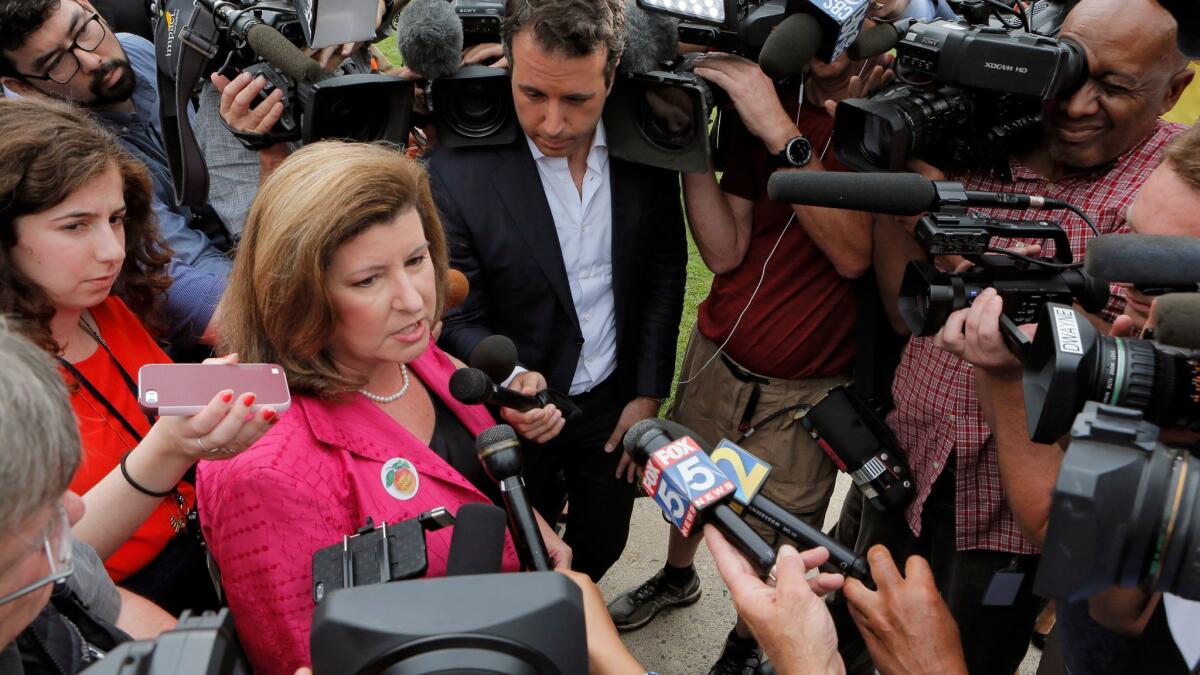Analysis:: There’s only one Trump — that’s a key challenge for Democrats targeting GOP seats in 2018

Democrats have hoped that President Trump’s deep unpopularity would propel them to gains in next year’s midterm election as they fight to take control of the House and improve their position in the Senate.
But last year’s contests and this year’s special elections suggest a complication: Trump is so distinctive a politician that it’s hard to persuade voters that other Republican candidates are carbon copies of the president. Trump’s outsized persona makes even those Republicans who share his views seem more moderate, an important attribute to swing voters.
For the record:
1:08 a.m. June 30, 2019An earlier version of this story said the race to replace Xavier Becerra was won by by Jimmy Garcia. It was won by Jimmy Gomez.
That presents a problem for the party out of power.
Midterm elections traditionally serve as referendums on the president, but voters’ complicated views of Trump may give Republicans more running room than his popularity figures suggest. The votes cast by individual Republican incumbents may be more important to their survival than any linkage with the president.
The first of those key votes is scheduled for this week, as senators confront the GOP healthcare measure, which closely resembles a House-passed bill that is widely unpopular.
In an NBC News/Wall Street Journal poll released Friday, only 16% of adults supported the House plan. Three times that percentage thought it was a bad idea. Yet it is far from clear how powerful the issue will be in 2018, given the fast pace of political events.
Warning signs emerged for both parties after the spring series of special elections. Four of the races picked successors to Republicans elevated to senior positions in Trump’s administration; Republicans won all four. A fifth race, to replace California Democrat Xavier Becerra, the state’s new attorney general, was won by Democrat Jimmy Gomez.
Simply going into the district and trying to tie them to Trump is not going to be enough to defeat them.
— Katie Merrill, California-based strategist
In each of the four races in GOP districts, Democratic candidates came far closer to the Republicans than their party has in the recent past — but they did not succeed.
Implicit in the contests was a Democratic effort to repudiate Trump. Yet in the races which attracted more attention and money, Democrats may have suffered from a backlash as the virulence of their opposition pushed more Republicans to the polls.
In the aftermath, Democrats have offered as a partial excuse the Republican voting strength in those districts. But winning next year will require succeeding in Senate races in states that voted for Trump and in House contests where Republicans have the power of incumbency, something they did not enjoy in the special elections this year.
Tuesday’s results in the 6th Congressional District in Georgia, the most expensive House race in history, demonstrated what candidates next year face. There, as elsewhere, Trump loomed over the race even though the candidates seldom talked about him directly.
Republican Karen Handel barely mentioned the president, although members of his administration served as reinforcements for her. Her campaign spent much of its time casting Democrat Jon Ossoff as in league with former House Speaker Nancy Pelosi and “San Francisco values.” Handel won by just under 4 percentage points.
Ossoff backed away from criticism of Trump in the latter part of the race, but began it by contending that his victory would “make Trump furious.”
Connecting the Republican president and Republican candidate did not work there, suggesting it may not work elsewhere, Republican and Democratic strategists said.
“Voters have very complex feelings about Donald Trump,” said California-based strategist Katie Merrill, citing polling from swing districts around the country. “He’s wildly unpopular, but they still want Congress to try to work with him — and Congress is more unpopular than he is.”
“Simply going into the district and trying to tie them to Trump is not going to be enough to defeat them,” said Merrill, who is working for a super PAC seeking to defeat seven Republican House incumbents in California districts won last year by Hillary Clinton.
Rick Gorka, a Republican National Committee spokesman, noted that the president consistently ranks higher than generic GOP candidates among many key voter groups.
“Voters look at Trump as his own brand, his own entity,” Gorka said. “His vision and what he is doing is separate from Republicans in voters’ minds. That’s been clear from the 2016 campaign to today.”
Indeed, the 2017 House race in Georgia bore similarities to Senate races last year in which Republican candidates benefited from Trump’s strength among rural and blue-collar voters without losing popularity among the suburban and college-educated voters who were more skeptical about him. Those voters saw the candidates as distinct.
In Pennsylvania, Republican Pat Toomey spent his successful Senate race talking about Trump only when asked and avoided being in the same television frame with the presidential candidate even when they were campaigning near one another.
Democrat Katie McGinty sought to link the two in a state that had voted Democratic in presidential contests since 1988.
“Donald Trump and Pat Toomey have plenty in common,” her campaign declared in one of many attempts to equate the two men.
But the two Republicans came off as anything but the same. In late October, Trump delivered an address near the heralded battlefield at Gettysburg in which he fulminated angrily at what he said was a rigged electoral system and a corrupt media. He vowed to sue “all of these liars” — the women then accusing him of sexual misconduct.
At the same time, Toomey was far to the north in Hazleton, looking like a generic suburban dad in his blue button-down shirt and gray pants, softly commiserating with teenagers and greeting a baby as he spoke to supporters in a restaurant.
He did not mention Trump’s name.
“He’s running his campaign, and I’m running mine,” Toomey would say when asked about Trump.
Next door in Ohio, Republican Rob Portman operated the same way, avoiding appearing with or mentioning Trump.
“We are focused on running our race,” his campaign manager, Corry Bliss, said then. This year, Bliss played a key role in directing millions of dollars into the Georgia race for Handel’s benefit from his new perch as head of a super PAC affiliated with House Speaker Paul D. Ryan.
If Republican candidates in tight races succeeded by avoiding too close an attachment to Trump, they are now in a more difficult position of having to answer for votes that were hypothetical when they ran for office.
The healthcare measure is the most glaring example so far, one that could usher in a rash of carefully calibrated statements as the 2018 elections near.
Democrats are pushing hard against Republicans who vote for the measure. But they are divided themselves on what healthcare moves to take — repairing Obamacare or pushing for universal healthcare — and that contrast could muddle voter reactions.
As happened in Georgia, a strategy that comes off as too partisan threatens to rile those Republicans who might otherwise be interested in switching sides.
For Republican incumbents, the challenge will be to replicate what worked last time — avoiding criticism of the president so as not to alienate his strong supporters, while keeping enough distance to attract voters more skeptical of him.
“Only now that they are incumbents in office are they starting to try to define themselves in a way separate from Trump,” said pollster J. Ann Selzer, who has conducted surveys throughout the Midwest this year.
In this sharply partisan atmosphere, she noted, the only unifying topic is a disdain for the status quo that could reverberate in unforeseen ways.
“It’s a long time,” she said, “between now and the midterms.”
Twitter: @cathleendecker
ALSO:
Senate Obamacare repeal bill would slash federal healthcare funding for Medicaid
Nevada Sen. Heller—a key swing vote—says he opposes Senate healthcare bill
Updates on California politics
More to Read
Get the L.A. Times Politics newsletter
Deeply reported insights into legislation, politics and policy from Sacramento, Washington and beyond. In your inbox three times per week.
You may occasionally receive promotional content from the Los Angeles Times.







